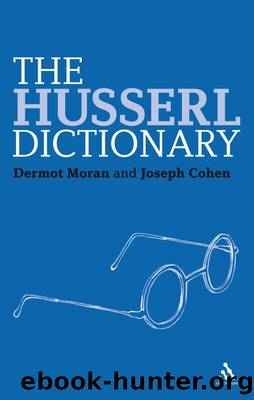The Husserl Dictionary (Continuum Philosophy Dictionaries) by Moran Dermot

Author:Moran, Dermot [Moran, Dermot]
Language: eng
Format: epub
Publisher: Continuum International Publishing Group Ltd.
Published: 2013-03-14T00:00:00+00:00
â M â
Mach, Ernst (1838â1916)âSee also phenomenalism
Ernst Mach was an Austrian scientist, physicist and philosopher who was regarded as an early positivist and phenomenalist. He was born in Churlitz, then part of Austria and now part of the Czech Republic. He entered the University of Vienna in 1855 and received his doctorate in physics there in 1860 and his Habilitation in 1861. He taught mathematics at the University of Graz and in 1866 was made Professor of Physics there. The following year he moved to a chair in physics at Prague where he remained until 1895 when he moved back to the University of Vienna. In 1901 he retired from the professorship and was made a member of the upper house of the Austrian parliament. Mach was interested in physiology and studied with Fechner and was influenced by his Elements of Psychophysics (1860). His scientific research work focused on the recently discovered Doppler Effect and his studies on sound have led to the unit of the speed of sound being named after him. Mach was the author of The Analysis of Sensations and the Relation Between the Physical and the Psychical (Die Analyse der Empfindungen und das Verhältnis des Physischen zum Psychischen, 1902). His position is regarded as phenomenalist. He claimed that physics ought to describe experience as accurately as possible. Husserl regarded him as one of the forerunners of phenomenology because of his attempt to describe precisely what was given in experience. He was deeply influential on the logical positivism of the Vienna Circle. He also advocated monism and published articles in The Monist.
Masaryk, Thomas (1850â1937)âThomas Masaryk was born to a poor family in Hodonin, Moravia,and, at the age of 12, he left school to work as a blacksmith, but enrolled in the University in Brno and then the University of Vienna in 1872. His first thesis, Principles of Sociology (1877) was rejected, largely because sociology was still a suspect discipline, but his second thesis on suicide in 1878 was eventually accepted through the support of Brentano. In 1880 he converted from Catholicism to Protestantism. An activist Czech nationalist, he eventually elected President of Czechoslovakia in 1918 and remained in the post until 1935. Thomas Masaryk was a lifelong friend of Husserl. He convinced Husserl to study with Brentano in 1884 and later was active in encouraging Husserl to read the British empiricists. Masaryk was also influential in converting Husserl to Christianity, leading to Husserlâs baptism in the Lutheran church in Vienna on 26 April 1886. In 1915 Masaryk became a professor in Slavonic studies in Kingâs College, London. As President of Czechoslovakia he tried to use his position to protect Husserl from political persecution by the National Socialists in Germany.
Material thing in spaceâSee also adumbration, object, thing
Husserl considers that the solid material thing in space with rigid boundaries is the exemplary concept of the thing. It is grasped directly in perception and other kinds of material entity, fluids, water, air, etc., are always grasped relative to material solid things (see Ideas II § 16).
Download
This site does not store any files on its server. We only index and link to content provided by other sites. Please contact the content providers to delete copyright contents if any and email us, we'll remove relevant links or contents immediately.
| Deconstruction | Existentialism |
| Humanism | Phenomenology |
| Pragmatism | Rationalism |
| Structuralism | Transcendentalism |
| Utilitarianism |
The remains of the day by Kazuo Ishiguro(8999)
Tools of Titans by Timothy Ferriss(8396)
Giovanni's Room by James Baldwin(7346)
The Black Swan by Nassim Nicholas Taleb(7129)
Inner Engineering: A Yogi's Guide to Joy by Sadhguru(6796)
The Way of Zen by Alan W. Watts(6614)
The Power of Now: A Guide to Spiritual Enlightenment by Eckhart Tolle(5782)
Asking the Right Questions: A Guide to Critical Thinking by M. Neil Browne & Stuart M. Keeley(5775)
The Six Wives Of Henry VIII (WOMEN IN HISTORY) by Fraser Antonia(5515)
Astrophysics for People in a Hurry by Neil DeGrasse Tyson(5190)
Housekeeping by Marilynne Robinson(4447)
12 Rules for Life by Jordan B. Peterson(4304)
Ikigai by Héctor García & Francesc Miralles(4274)
Double Down (Diary of a Wimpy Kid Book 11) by Jeff Kinney(4272)
The Ethical Slut by Janet W. Hardy(4253)
Skin in the Game by Nassim Nicholas Taleb(4249)
The Art of Happiness by The Dalai Lama(4130)
Skin in the Game: Hidden Asymmetries in Daily Life by Nassim Nicholas Taleb(4007)
Walking by Henry David Thoreau(3962)
